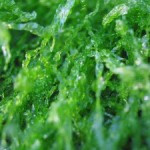Israeli Researchers See Biofuel Potential in Seaweed
 One of the major criticisms of biofuels is that they compete with food in terms of land use, driving prices up. In order to solve the problem, how about looking to the ocean as a source of biofuel?
One of the major criticisms of biofuels is that they compete with food in terms of land use, driving prices up. In order to solve the problem, how about looking to the ocean as a source of biofuel?Scientists from different departments at Tel Aviv University have discovered that marine macroalgae, the common seaweed, can be grown more quickly than land-based crops and harvested as fuel without sacrificing usable land. In other words, it is a potential source of clean bioethanol.
The researchers are now developing methods for growing and harvesting seaweed as a source of renewable energy. Not only can the macroalgae be grown unobtrusively along coastlines, they can also clear the water of excessive nutrients (caused by human waste or aquaculture), which disturb the marine environment.
Besides avoiding the problems caused by land-based biofuels, seaweed based sources could actually benefit the marine environment. One example is the Red Sea in the south of Israel, which has suffered from eutrophication, that is, pollution caused by human waste and fish farming. The latter leads to excessive amounts of nutrients and detrimental algae, ultimately harming endangered coral reefs.
The system that the researchers are developing is called the “Combined Aquaculture Multi-Use Systems” (CAMUS). It takes into account the realities of the marine environment and human activity in it. Ultimately, all of these factors function together to create a synthetic “man-made ecosystem,” said Prof. Avigdor Abelson, from TAU’s Department of Zoology. “By employing multiple species, CAMUS can turn waste into productive resources such as biofuel, at the same time reducing pollution’s impact on the local ecosystem,” he added.
The researchers are now working to increase the carbohydrate and sugar contents of the seaweed for efficient fermentation into bioethanol. If it all goes according to plan, seaweed could become a source of sustainable, efficient and cost-effective bioethanol.
You can return to the main Market News page, or press the Back button on your browser.

